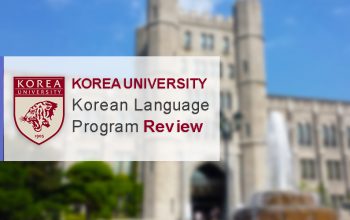
Which Korean language school suits me the best? Depending on your study goals, the type of experiences you plan on having in Korea, and what type of person you are, you can find out which Korean language school suits you the best. I write this blog post not only through my own knowledge and experience studying Korean at 3 different establishments in Seoul but also by interviewing my friends who I’ve met in Seoul and that have or are currently studying Korean at different Schools. This is not a post with reviews on schools, this will just give you an idea of which schools may suit you the best, and it is up to you to look deeper into the schools after that. See this post as a good start for you who recently decided that you want to come to Korea to study the language.
Step 1 – What is your goal?
Before even looking into curriculums, campus reviews, TOPIK preparations, etc. I would suggest you ask yourself what is your main purpose of studying Korean? What do you want to achieve or do you have a goal?
- Is it to be able to enjoy your love for Korean pop culture by knowing how to read and understand Korean jokes/expressions?
- Travel and get by in Korea with good conversational skills?
- Communicate with your Korean friends and/or partner?
- Get into a University program in Korea?
- Live and work in Korea?
- Become a translator?
Step 2 – Look into your study technique and self-discipline
Everybody studies and learns differently. We all are good and bad at different things and learn things at different paces. Let’s say you are a pretty average learner. You might be able to memorize quite well for a test but will soon forget most of it if you don’t actively use the new knowledge on a daily basis. So for an average learner, you might want to pick a school with classes Monday-Friday with some homework and try to practice speaking with new Korean friends or with your fellow classmates who may not know your native language and/or English. If you don’t have self-discipline like me you should definitely hang out more with the Asian students. Talk Korean together, go study together and they could help you understand the “test style” better. I had a hard time answering the tests due to the lack of time we were given and some multiple-choice questions were tricky.
So which schools should you look into? Check out the list below 🙂
Step 3 – Check out the types of Korean language school programs
There are soooo many options out there! Minus online classes, let us focus on the different Schools / Courses in Seoul Korea:
- Korean Language Institute at Universities – Most common
- Korean Language Hagwon (Academy)
- Private Korean Language Schools
1 Korean Language Institute at Universities
These universities are easy to apply to and get in, because you don’t need to pass a test to get in, just pay the tuition fees. Usually, 1 semester goes on around 10 weeks, from Mon-Fri, 4 hours a day. With a large campus and a large number of language students + exchange students, you will not feel like a lonely foreigner. Student activities are available everywhere. This is the best type of language program if you can afford the tuition fees. Always check if you need a visa for the time you want to study in Korea. The Universities will help you apply and answer most visa-related questions.
2 Korean Language Hagwon (Academy)
I attended YBM which is a well-known hagwon in Korea. I noticed they had a lot of language courses including Korean. However this is not a full-time student program, so you can’t apply for a visa and stay longer than a tourist. But if you are already here on a visa this could be a good alternative for you. For example, working holiday visa holders or those on other visas. They offer evening or morning classes 2-3 times a week for 2 hours each or weekend classes. The cost is actually reasonable. Have a look here for details.
3 Private Korean Language Schools
These are similar to hagwons but offering full-time programs. However, these companies probably do not sponsor you a visa (you will have to check if they can sponsor you a visa). Firstly the pros about private companies are that they are probably trying to sell a great class, so you will have to look at the reviews and contact somebody who has attended, then you’ll see some honest feedback. Secondly, the cons are higher risks to be unorganized compared to a university, because these companies are probably targeting younger or older students who want to learn Korean. So you won’t get a typical student life where everything is handed to you as a package deal if you should choose to pay and attend a course through a private school (similar to Hakwon).
Step 4 – Choose the School(s) to consider and research more!
Here’s a reminder! Whichever school you choose to apply for will have a similar curriculum, because I’ve noticed by asking other students from different schools. The testing style seems quite similar as well when I compared it. And to be completely honest your attitude towards studying Korean and the amount of luck you will have will determine if your class is deemed “good” or “bad” because at the end of the day you are the one who knows if the teacher you got assigned and the classmates you got suits you best or not. So don’t depend too much on the schools’ reputation. Frankly, any school will do if you have great self-discipline and study habits. But in short, here are some famous schools and to who I recommend them too:
For you who wants to focus more on learning conversational Korean:
Sogang University
Known for the best language program that focuses on speaking. The books are really good when paired with a teacher but not a great book for self-study. There are 3 books 1 Student book, 1 workbook (for homework), 1 grammar book (this one has good English explanations) and 1 writing book with exercises used in the lesson.
The types of students who apply:
are very mixed, the higher the level the more Asian students. Japanese and Chinese students are usually the majority in every language school, Songang is not an exception. But they try to mix the class so people don’t speak their native language. That is actually a classroom rule – only speak Korean but of course, during breaks, people want to relax and become friendly with each other. So don’t be surprised to hear Chinese, English, and Japanese.
My class experience at Sogang
I applied and started on level 2 out of 6. We had 3 teachers and 3 periods. Every day started with the writing period, then we had a small break time, we continued on with the speaking period where we continued using the topic or grammar point but in conversation, we repeated a lot, sometimes did memory games, etc, longer break time in the middle of the speaking period and lastly reading and listening period. Here we focused on reading a story/letter/article etc with a listening test or listen and fill in the blanks. Teachers always encouraging us to speak, write down things and ask questions.
For ambitious students, wanting a career in Korea:
Yonsei University
One of the prestigious “SKY Universities” in South Korea. They offer a wide range of Korean language programs. However, they are also known for teaching intensively. Therefore you should know how to study on your own in order to keep up in class. If you succeed and graduate from here you will have an easier time getting a job. They have their own job board and Yonsei just looks great on your resume.
Korea University Korean language center
This is also one of the prestigious “SKY Universities” and I actually studied from level 3-4 here.
My class experience at KU
You can see a detailed review of my time at Korea University here.
I will update this post with more University recommendations after I’ve spoken to more students and got an honest review from them. I wish you good luck with your future studies!
